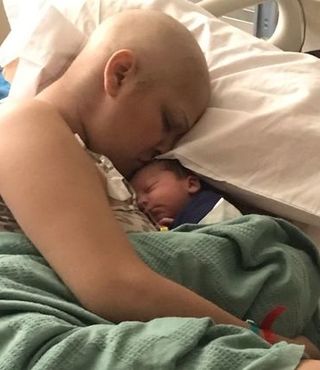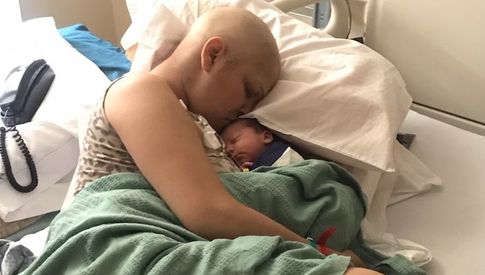From Jade's Care Team
“Many patients come to our hospital asking for us to just treat the cancer. What they do not know is that they’ll need more support on their journey. That’s what makes Loma Linda University Cancer Center unique.”
Your gifts help moms like Jade get lifesaving cancer care during pregnancy.
In early 2019, 36-year-old Jade Devis was several months pregnant. As the precious gift of life grew within her, though, so did a deadly disease. Jade would soon face a horrifying dilemma, forced to weigh her own health — and possibly even her life — against her child’s.
Jade learned she was pregnant in December 2018. In early 2019, she noticed a large, hard lump on her breast. While most breast lumps developed during pregnancy are benign (non-cancerous), Jade wasn’t willing to take a chance on “most.” She saw a physician in Pomona, who sent her to a radiologist for imaging. After her visit, Jade was told the lump was indeed likely a benign symptom of pregnancy.
But “likely” wasn’t good enough either, so Jade asked for a biopsy. The results marked the beginning of a terrifying journey. Not only was the lump breast cancer, it was one of the rarest, most aggressive forms — and it was starting to spread.
“If I had ignored it,” Jade says, “I would have been dead.”
Jade’s official diagnosis was stage 2 triple-negative breast cancer (or TNBC). Catching TNBC in early stages is rare because it both grows and spreads faster than other types of breast cancer. Even though Jade caught it relatively early, her chance of survival may have already dropped to 65%.
Because TNBC progresses so quickly, treatment needs to start as soon as possible. In Jade’s case, that would mean facing both surgery and chemotherapy, all while pregnant. And, while breast cancer surgery is generally safe during pregnancy, chemo can be a serious problem.
When Jade found out she needed chemo, she was in her first trimester (the first three months) of pregnancy. But chemo isn’t a viable option for pregnant women in their first trimester — the risks to the baby are unknown. Jade learned the earliest she could start chemo while pregnant would be her second trimester. Her cancer could grow to stage 3 or even stage 4 during that time, and her chance of survival could shrink to 11%.
Even if Jade risked her life by waiting until her second trimester, her doctors couldn’t guarantee her son would be healthy. Chemo in the second and third trimester increases the risk of premature birth and can cause complications during birth if given too recently. On top of everything else, it’s not known whether chemo drugs can have long-term effects on a child’s health.
Jade’s doctors at the time told her delaying treatment could kill her, and that her baby was too young to save.
Jade felt trapped. She was caught between two terrifying options, facing an impossible choice.
Her first option: wait to get chemo, risking her life. And what if waiting meant her cancer would win? As a single mom, what would happen to her child if Jade lost her life?
Her second option: terminate her pregnancy — say goodbye before she even had the chance to meet her baby.
When her doctors recommended the second option, though, her choice became clear.
“I did not know how I felt about the pregnancy until I was told I should not continue my pregnancy. That is when something rose up inside of me — I wanted to keep my baby because I would not allow a stranger to tell me my child’s fate.”
In that moment, Jade knew she would do anything to save her child. She would walk any path — even sacrifice herself — if it meant her baby had a chance. Simply put, Jade was a mom.
With her choice made, Jade’s doctors told her she would need a specialist better equipped to handle her situation. She hoped to find a doctor with both the expertise to care for her cancer and the compassion to care about her baby and herself. She found herself at Loma Linda University Cancer Center in the care of breast cancer specialist Dr. Gayathri Nagaraj.
Dr. Nagaraj quickly got to work planning out Jade’s treatment timeline. It was April, and Jade was entering her second trimester. She would start chemo as soon as possible and would need multiple rounds to fight the triple-negative breast cancer. To avoid complications, Dr. Nagaraj planned to stop chemo several weeks before Jade was scheduled to be induced. After birth, Jade would undergo more chemo with drugs that hadn’t been safe during pregnancy. And, finally, radiation therapy would complete her treatment.
During her treatment, Jade would also have the full support of an entire team of cancer, pregnancy and childbirth experts. Breast cancer team nurse navigator Amanda Edwards hand-picked the team to give Jade and her baby the best care possible. Jade’s pharmacist, dietitian, nurses, social workers and high-risk obstetricians took special care of her physical and mental health.
Jade never stopped worrying about how the treatments would affect her baby, but Dr. Nagaraj and the care team helped keep her positive.
Your gifts help moms like Jade get lifesaving cancer care during pregnancy.
“Many patients come to our hospital asking for us to just treat the cancer. What they do not know is that they’ll need more support on their journey. That’s what makes Loma Linda University Cancer Center unique.”
At the end of July 2019, after a journey that exhausted her on every level, Jade finally got to meet her son, Bradley. He had made it, he was healthy and he was, at long last, hers to hold.
“My baby boy is my miracle child,” Jade says. “It is surreal to remember that my pregnancy had an element of extraordinary fear. I am blessed when I look at my son, and I cannot ask for more than that.”
While Jade might not have asked for another miracle, she certainly got one. Recently, she finished her final rounds of cancer treatment and got her first of many post-treatment scans. She’s cancer-free.


“Loma Linda University Cancer Center team gave me more than my son. They picked up my spirit and rejuvenated my soul.”
Today, along with the side effects of cancer treatment, Jade is dealing with everything that comes with parenthood. However challenging this new path, she’s grateful for it all — and perhaps doubly grateful she has help from her mom and sisters.
Without your support, moms like Jade wouldn’t be able to count on Loma Linda University Health. That’s because gifts from our donors are crucial to supporting services that save lives in our community every day.
Your gifts can help make miracles happen. Give Now